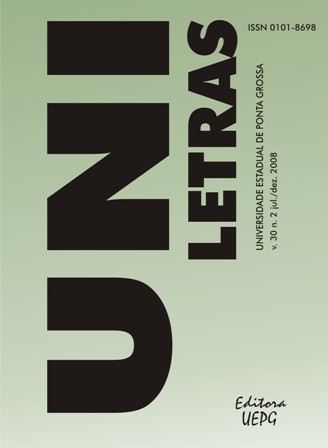A REPRESENTAÇÃO IMAGÉTICA DA IDENTIDADE DO PROFESSOR - Doi: http://dx.doi.org/10.5212/Uniletras.v.30i2.265275
DOI:
https://doi.org/10.5212/uniletras.v30i2.516Abstract
Sob os pressupostos da Análise do Discurso de linha francesa e as teorias de Barthes (1984) sobre fotografi a, este artigo analisa uma imagem fotográfi ca da capa da revista Nova Escola da Edição 188, de dezembro de 2005. O objetivo é reconhecer a identidade do professor construída pela e na mídia através dos enunciados imagéticos. Para tanto, parte-se do pressuposto que a imagem é um componente representativo produtor de dizeres e causador de efeitos de sentido. Em termos de resultados, é possível afi rmar que a capa apresenta uma representação de técnicas modernas de ensino que remete a identidade do professor moderno.
Palavras-chave: Fotografi a. Professor. Identidade e mídia.
According to the assumptions of the French approach to Discourse Analysis and Barthe’s theories (1984) on photography, this work analyzes a photographic image of the cover of the New School Magazine, issue 188, December 2005. The aim is to recognize the identity of the teacher as constructed by, and inside the media, through the image shown. Thus, it is assumed that image is a representative component producer of speech and also of meaning. As a result, it is possible to say that the cover shows a representation of modern teaching techniques that are related to the identity of the modern teacher.
Keywords: Photography. Teacher. Identity and media.
Downloads
Downloads
Published
Issue
Section
License
Authors that publish in the journal agree with the following terms:
a) The authors keep the copyright and grant to the journal the rights of the first publication, with the work simultaneously being licensed under the Creative Commons Attribution License that allows the sharing of the work with the recognition both of the authorship and the initial publication in this journal.
b) This journal provides immediate public access to all of its content, following the principle that making scientific knowledge freely available to the public provides greater worldwide democratization of knowledge. For more information about this approach, visit Public Knowledge Project, a Project that developed this system to improve the academic and public quality of research, distributing OJS as well as other softwares to support the publication system to public/open access to academic sources. Names and e-mail addresses in this website will be used exclusively for this journal purposes, not being available for other ends.

This work is licensed under a Creative Commons Attribution 4.0 International License.





